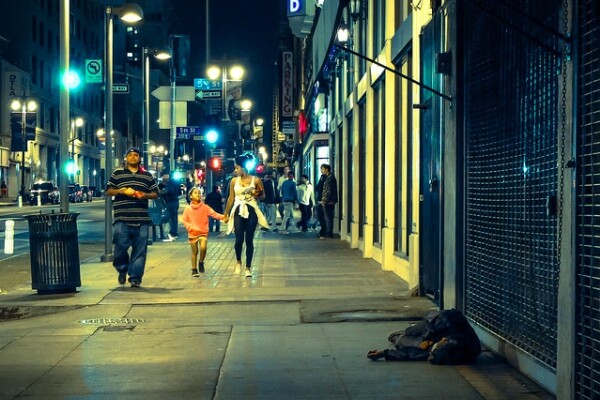Feeding The Homeless: A Criminal Act

Two weeks ago, the National Coalition for the Homeless released a startling report tracking the criminalization of feeding the nation's homeless. As they state, since January 2013, twenty-one American cities have enacted regulations that restrict homeless peoples' access to food. Since the report was issued, Fort Lauderdale, Florida passed another restrictive regulation, meaning the number of cities now totals 22.
Generally, these regulations are sold to the community as well-intentioned rules. Say, making sure the food being given to the homeless is "safe," or forcing food workers to be properly credited. The problem is, each extra step of bureaucracy is a roadblock between food and the people that need it.
To learn more, I spoke with Michael Stoops, Director of Community Organizing for the coalition, about the report.
There's a broad range of laws that restrict feeding the homeless. Are some worse than others?
Michael Stoops: Often, the ordinances are proposed with stated good intentions. They want to make sure homeless people don't get food poisoning, they want to make sure food is safe, that volunteers are certified, et cetera. Of course, we're concerned about food safety issues. But in reality, people have been sharing food with the homeless for many, many years and it hasn't been an issue. I think the worst restriction is when a group has to get a permit, pay for that permit, and then you can only get a permit several times a year. Those are the ones that are the worst, and it has an impact on groups who have been building food-sharing when they find out they can be fined, or even go to jail, for sharing food.
Is there a reason for an expansion of these regulations?
Michael: It's our analysis -- and my personal analysis, because I've been working in this field for four decades -- that the motivation behind it is not to protect homeless people from food poisoning. The reason is that city leaders and businesses and neighbors are tired of the homeless population, and they think that by cutting off their food source, the homeless will suddenly go away. And they won't, of course. It might disperse homeless to other parts of the city, but it's not going to get rid of the population.
Is there a particular type of city that enacts these regulations?
Michael: It used to be just big cities along the East Coast and West Coast, but homelessness is no longer just confined to, say, Skid Row in Los Angeles. You'll find homelessness in shelters, in food kitchens, in medium-sized cities, large cities, rural areas. Homeless people are everywhere. And we have found that where the criminalization of homelessness is done the most is in so-called tourist or sunny states, like California and Florida.
Are there specific California cities that are particularly bad?
Michael: L.A. is written up very poor. Santa Monica has been bad. And it's been an issue in Hollywood.
What effect do you hope these reports have?
Michael: When we put out these reports, we hope it shames and embarrasses cities to keep them from doing this, and galvanize folks to have a moratorium declared. We need a solution. If you wanted to eat three meals a day, seven days a week, indoors, I'm not aware of any city in the country where you can do that. And if you do do that, you'll be spending all of your time going from point A to point B to point C. In any given city, if they really wanted to help people, they would make sure there was a system in place of indoor meals, three times a day, seven days a week. There would be fewer people hanging out in the parks, waiting for people to come by with food. We have moral and legal and religious reasons for sharing food with the homeless.
Are there parts of the country that do it right?
Michael: There's no city in the country that's doing everything right with the homeless issue. There are model projects in every community, but there's no one city that is doing everything.
Well-intentioned people may look at the homeless problem on a macro level with sympathy, but when it comes to homeless outside of their work or house, they want them to get lost. Where's the disconnect?
Michael: There have been surveys done for people who work or live downtown, and people complain about the lack of parking or how much it costs first, and then the second thing is dealing with panhandlers, folks who have mental health or substance abuse problems. I think Americans do not like to be reminded that we have visible homelessness in our midst. My pitch to people when they run into homeless folks, is that someone asking for spare change is not the end of the world. It's part of our urban landscape. People have to get used to it.